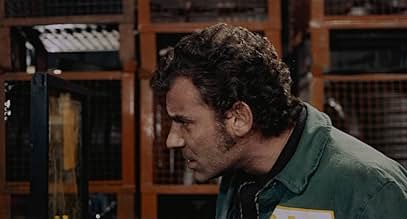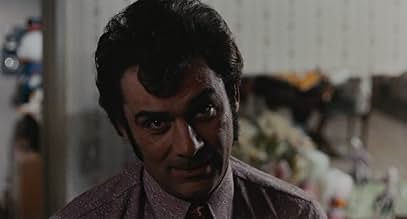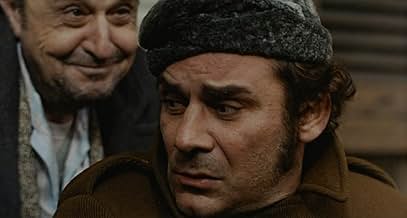La classe ouvrière va au paradis
Titre original : La classe operaia va in paradiso
- 1971
- Tous publics
- 2h 5min
NOTE IMDb
7,6/10
4,3 k
MA NOTE
Un ouvrier d'usine consciencieux perd un doigt dans une machine. Bien que le handicap physique ne soit pas grave, cela l'entraîne à s'impliquer de plus en plus dans des groupes politiques et... Tout lireUn ouvrier d'usine consciencieux perd un doigt dans une machine. Bien que le handicap physique ne soit pas grave, cela l'entraîne à s'impliquer de plus en plus dans des groupes politiques et révolutionnaires.Un ouvrier d'usine consciencieux perd un doigt dans une machine. Bien que le handicap physique ne soit pas grave, cela l'entraîne à s'impliquer de plus en plus dans des groupes politiques et révolutionnaires.
- Récompenses
- 7 victoires et 4 nominations au total
Nino Bignamini
- Salvatore Quaranta
- (as Giovanni Bignamini)
Histoire
Le saviez-vous
- AnecdotesElio Petri's "La classe operaia va in paradiso" shows a very subtle cameo of Ennio Morricone, who also composed the original score of this film, awarded with a Palme d'or in the 1972 Cannes Film Festival. The Italian Maestro appears in close-up for almost one minute as the anonymous--and obviously uncredited--blue-collar who actions the cart, with both hands up and down, at the end of the assembly line in the factory. His repeated gesture immediately activates the "mechanical" music that announces the end titles.
- Citations
Lulù Massa: If you want my food, take it. I'm not hungry, I've a rift in my stomach.
- ConnexionsFeatured in Italian Gangsters (2015)
Commentaire à la une
This film is both fantasy and complete reality at the same time. Gian Marie Volonte plays an extremely efficient worker doing piecework in a factory, not even sure what the parts he produces are used for. At the same time, Volonte's precise rhythm and total concentration make him an object of hate amongst his fellow workers, all of him are continually time managed by snidey supervisors who mostly hide behind a yellow screen in an observation box. A large hand, index finger pointing down oppressively, is printed on the wall above the workers.
Volonte is a good worker but not good at anything else. His son lives with his ex-wife and fellow worker. He can't get it up for his girlfriend, and her little boy spends his time totally consumed by television. Exhausted from working all day, Volonte's only break from routine is to visit and colleague who has ended up in an asylum. Soon enough, Volonte begins to think that what this man is saying is making sense...
Outside the factory, radical communists screams slogans through megaphones and clash with the unions as the workers trudge in to start their shift. Volonte gets to work right away, but his fellow workers are grinding him down, and a lapse in concentration means that Volonte loses a finger and his whole world outlook changes.
Be warned, this film has so many scenes of people screaming into microphones, or crowds of people screaming at each other, that if you're not careful you'll end up with a headache. I'm guessing that might be part of intention of the film to a certain extent. With the loss of the finger Volonte loses his urge to be the best worker and starts to see how his life in the factory may not be a life at all, but all those folk screaming about smashing the system or how unity can get better rights, are they any less self-serving than those in charge at the factory?
Petri does everything he can to make the factory look like some sort of prison, continually filming through bars and even doing the same thing later with a school. Ennio Morricone's soundtrack also enforces the idea of some kind of industrial trap where the self is wiped away in place of production. The film is run down and grey on purpose, but there are a few bits of Petri's weird visuals here and there - like the strange diagram Volonte faces while getting psychologically tested.
The main reason for watching this is for Gian Marie Volonte, who comes across as a guy who isn't that smart, a man who makes an arse of everything and in losing the only thing he was good at starts unravelling. In the Italian language version you can hear how fragile and hysterical Volonte sounds. He seems to mess up just about every conversation and even when he thinks he's made the wrong choice, it dawns on him that he's not the only one that's shallow.
Good film this. Nearly two hours long though!
Volonte is a good worker but not good at anything else. His son lives with his ex-wife and fellow worker. He can't get it up for his girlfriend, and her little boy spends his time totally consumed by television. Exhausted from working all day, Volonte's only break from routine is to visit and colleague who has ended up in an asylum. Soon enough, Volonte begins to think that what this man is saying is making sense...
Outside the factory, radical communists screams slogans through megaphones and clash with the unions as the workers trudge in to start their shift. Volonte gets to work right away, but his fellow workers are grinding him down, and a lapse in concentration means that Volonte loses a finger and his whole world outlook changes.
Be warned, this film has so many scenes of people screaming into microphones, or crowds of people screaming at each other, that if you're not careful you'll end up with a headache. I'm guessing that might be part of intention of the film to a certain extent. With the loss of the finger Volonte loses his urge to be the best worker and starts to see how his life in the factory may not be a life at all, but all those folk screaming about smashing the system or how unity can get better rights, are they any less self-serving than those in charge at the factory?
Petri does everything he can to make the factory look like some sort of prison, continually filming through bars and even doing the same thing later with a school. Ennio Morricone's soundtrack also enforces the idea of some kind of industrial trap where the self is wiped away in place of production. The film is run down and grey on purpose, but there are a few bits of Petri's weird visuals here and there - like the strange diagram Volonte faces while getting psychologically tested.
The main reason for watching this is for Gian Marie Volonte, who comes across as a guy who isn't that smart, a man who makes an arse of everything and in losing the only thing he was good at starts unravelling. In the Italian language version you can hear how fragile and hysterical Volonte sounds. He seems to mess up just about every conversation and even when he thinks he's made the wrong choice, it dawns on him that he's not the only one that's shallow.
Good film this. Nearly two hours long though!
Meilleurs choix
Connectez-vous pour évaluer et suivre la liste de favoris afin de recevoir des recommandations personnalisées
- How long is The Working Class Goes to Heaven?Alimenté par Alexa
Détails
- Date de sortie
- Pays d’origine
- Langue
- Aussi connu sous le nom de
- The Working Class Goes to Heaven
- Lieux de tournage
- Société de production
- Voir plus de crédits d'entreprise sur IMDbPro
- Durée2 heures 5 minutes
- Mixage
- Rapport de forme
- 1.85 : 1
Contribuer à cette page
Suggérer une modification ou ajouter du contenu manquant

Lacune principale
By what name was La classe ouvrière va au paradis (1971) officially released in Canada in English?
Répondre















